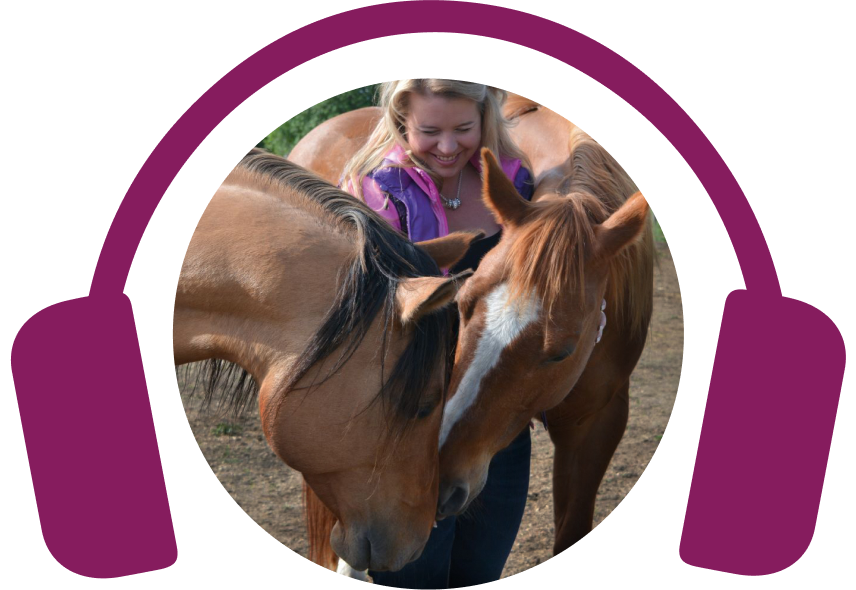Elisha’s Podcast
ELISHA’S PODCAST

Ready to get your horses on the path to better health?
This podcast was created to do just that.
Tune in to get new insights, perspectives, horse health tips, and real-life horse healing stories.
Take what you learn and apply it to your horse TODAY.

One Conversation at a time
From learning what to feed your horse and how to use nutrition effectively, to practicing prevention and approaching specific health challenges naturally, to just bringing your horse more joy and better health…
I’ve got you covered!

Check out my recent episodes
This week, I share three homeopathic remedies for horses with colds or flu. The seasonal shift to winter can make horses more susceptible to colds and flu, as horses often experience a dip in immunity as they transition to their winter coats and face changes in their diet, digestion, and hormones. As a result, we tend to see inflammation and various health issues cropping up during the fall. Aconite Aconite is a homeopathic remedy often used for horses with colds, flu, or general malaise. It is particularly effective for horses experiencing fear, panic, or trauma. This remedy also works for acute inflammation across various organ systems, especially when symptoms arise suddenly. Symptoms to look out for include intense thirst, heightened sensitivity to noise and touch, a dry cough, or shortness of breath. It is best to use Aconite in higher potencies (200C), administered without food, and at a frequency of one dose per day until symptoms subside. Gelsemium Gelsemium is suitable for horses experiencing profound weakness and fatigue, making it a good choice for those who seem incapacitated. Symptoms associated with Gelsemium include drowsiness, droopy eyes, and a low-hanging head. This remedy can also be effective for horses suffering from performance anxiety or stage fright. In cases of colds or flu, Gelsemium helps with symptoms of extreme fatigue, and it can even assist in addressing some respiratory conditions. It also gets used for horses that appear dizzy or uncoordinated due to weakness. Homeopathic Influenza The Homeopathic Influenza remedy targets symptoms of the flu. It can be particularly effective for horses affected by viral infections. It matches the symptom picture of flu and helps stimulate immune defenses to combat the virus. Homeopathy focuses on the symptom picture rather than the specific strain of the virus, making it versatile for various flu symptoms, including chills, fever, and aches. Homeopathic Influenza can also work in herds when flu is circulating among horses. General Recommendations It is advisable to use those remedies at a potency of 200C, although 300C can also be effective. Homeopathy emphasizes getting results and then backing off. Once you see improvement, discontinue the remedy, as the immune system may continue to strengthen without further dosing. Integrating Nutritional Support In addition to homeopathic remedies, nutritional support plays a vital role in the recovery of horses. Consider supplementing their diet with vitamins, particularly vitamin C, which can bolster their immune system during colds or flu. High-quality hay and easy-to-digest grains can also help maintain energy levels and overall health. Remember, a well-nourished horse is more able to fight off illnesses, so dietary considerations are just as significant as the remedies themselves. Consult with a Professional While homeopathic remedies can be effective, it is advisable to consult a certified homeopath or veterinarian if symptoms persist or worsen. Building Your Homeopathic Kit Creating a homeopathic kit is an excellent proactive measure for any horse owner. Alongside Aconite, Gelsemium, and Homeopathic Influenza, consider including remedies for common ailments, like Arnica for trauma or injury and Belladonna for fever and inflammation. Having homeopathic remedies readily available can save time and stress during emergencies, allowing for prompt treatment when your horse needs it most. Remember that the goal of homeopathy is not just to alleviate symptoms but to support the health and resilience of your horse. Links and resources: Connect with Elisha Edwards on her website Join my email list to be notified about new podcast releases and upcoming webinars. Free Webinar Masterclass: Four Steps to Solving Equine Metabolic Syndrome Naturally Register for Resolving Equine Metabolic Syndrome Naturally, now. Today, we are exploring the benefits of Vitamin B6. Vitamin B6 is an essential nutrient for horses and humans, and I use it regularly for various purposes. In this episode, I explain how it functions in the body, the signs and causes of a Vitamin B6 deficiency, and how to use it effectively. Vitamin B6 gets used for its therapeutic properties in horses, even without a confirmed deficiency. Many horses are likely deficient in Vitamin B6, especially those on hay diets without access to fresh forage. In Canada, the CFIA mandates minimum levels of fat-soluble vitamins (A, D, E) in horse feeds, but B vitamins like B6 are often left out. That can lead to deficiencies, as the commercial feeds might not always meet the nutrient requirements of some horses. Many horses struggle to absorb nutrients from their feed, especially those with digestive issues like ulcers, colic, or diarrhea. Even when given sufficient food, compromised digestion can reduce the effectiveness and compound nutritional deficiencies over time. Vitamin B6 is essential for carbohydrate, protein, and fat metabolism, so it is critical for horses with metabolic conditions like insulin resistance. Vitamin B6 also supports magnesium and Vitamin B12 absorption and helps to address those nutrient deficiencies. Vitamin B6 helps with conditions like itchy, flaky skin and hives in horses. It also improves immune health by regulating inflammation and fluid retention, making it particularly useful for horses with metabolic issues. Vitamin B6 is involved in neurotransmitter production, like serotonin and melatonin, which affect brain health and mood regulation. Horses with anxiety, depression, or behavioral issues may benefit from Vitamin B6 supplementation, as it helps balance the nervous system. Vitamin B6 helps regulate estrogen, making it useful for mares with hormonal issues or insulin-resistant horses with liver stress. It supports liver detoxification, which is crucial for horses with a high toxic load due to poor diet or metabolic conditions. Vitamin B6 is in flax and wheat germ, but it is hard to determine the exact amount in horse feed. As such, targeted Vitamin B6 supplementation is often necessary to meet their needs. Deficiency symptoms include hormonal imbalances, weight gain, joint inflammation (often misdiagnosed as arthritis), skin problems, depression, and anxiety. So, horses with these symptoms tend to improve with Vitamin B6 supplementation. The recommended Vitamin B6 dose for horses is around 750 mg of B6 daily, with up to 1000 mg for a loading dose. The pyridoxine form of B6 is commonly used for horses, while the P5P form is more bioavailable for humans. Vitamin B6 offers significant benefits, from supporting metabolic health to improving behavioral issues and reducing inflammation. If you are trying Vitamin B6 for your horse, pay attention to any health or mood changes and adjust the dosage as needed. Connect with Elisha Edwards on her website Join my email list to be notified about new podcast releases and upcoming webinars. Free Webinar Masterclass: Four Steps to Solving Equine Metabolic Syndrome Naturally Register for Resolving Equine Metabolic Syndrome Naturally, now. Today, we are tackling the topic of swelling, a symptom I often encounter in horses. Swelling, particularly in the udder or sheath, is usually accompanied by extremity swelling (peripheral edema) due to fluid pooling in the legs. Visible swelling is a common concern for horse owners. It is never a good sign, especially if it becomes chronic. When I see fluid retention in horses, I think about the lymphatic system. The lymphatic system maintains the fluid balance between the blood and tissues, excreting toxins and supporting the immune system. Many owners fail to recognize fluid retention in their horses, mistaking it for weight gain. But they usually realize it when they notice the swollen or puffy tissues. Once these horses get put on a proper metabolic program, the swelling reduces, and they lose significant weight. Fluid retention in horses can be the result of various factors. Insulin resistance and metabolic issues are common, but owners should consider thyroid health, liver function, and lymphatic efficiency. Damaged capillaries due to advanced insulin resistance can cause fluid leakage, and protein deficiencies can also result in fluid buildup, presenting a pot-bellied or bloated appearance. A big reason for fluid retention is a lack of movement. Horses must move as their lymphatic system relies on movement to function properly. Their hooves play a vital role in circulating blood and lymph, and when horses stand still for long periods, the fluid retention worsens. So movement is essential, whether through exercise or simply encouraging them to walk around in their environment. Sugar content in a horse's diet, especially from grass, plays a significant role in fluid retention. Too much sugar leads to glycogen storage, which causes water retention. By controlling the sugar intake and increasing fiber, protein, and healthy fats, the swelling will reduce, and metabolic function will improve. However, diet alone will not solve the problem if the horse does not move enough. If swelling persists despite addressing movement and sugar levels, it is worth exploring allergies or protein deficiencies. Sometimes, horses react to particular types of hay or even alfalfa, which may lead to inflammation and fluid retention. Ensuring a balanced protein intake is essential, as low protein can cause fluid to pool in the belly area. Stress affects insulin and cortisol levels, potentially damaging capillaries and leading to fluid retention. Movement is a great way to reduce stress and improve circulation, and exercise is a critical factor in managing insulin resistance and overall health. Once the diet and movement of the horse are optimized, supplements can help address any remaining fluid retention. Vitamin B6 is my go-to, as it helps reduce fluid retention by acting as a diuretic and improving kidney function. Magnesium can also be helpful, but B6 is usually the most effective supplement. Fluid retention in horses is a common issue and often a sign of underlying problems like poor circulation, high blood sugar, or nutritional imbalances. Movement, diet, and stress management are the keys to addressing it, with supplements like B6 providing additional support if needed. Connect with Elisha Edwards on her website Join my email list to be notified about new podcast releases and upcoming webinars. Free Webinar Masterclass: Four Steps to Solving Equine Metabolic Syndrome Naturally Register for Resolving Equine Metabolic Syndrome Naturally, now.Nutrient Deficiency and Therapeutic Use of B6 in Horses
Regulatory Minimums in Horse Feeds
Digestive and Absorption Challenges
Role of B6 in Metabolism and Health
B6 for Skin, Immunity, and Inflammation
Neurological and Behavioral Benefits
Hormonal Imbalance and Liver Support
Sources of B6
Signs of Vitamin B6 Deficiency
Proper Dosage and Forms
Conclusion
Links and resources:
The Lymphatic System
Fluid Retention
Factors Contributing to Fluid Retention
Movement is Key
Diet and Sugar Content
Allergies and Protein Deficiency
Stress and Hormonal Factors
B6 and Magnesium Supplements
Conclusion
Links and resources:
Meet your host
Hi there, I’m Elisha Edwards

Meet your host
Hi there, I’m Elisha Edwards
I have helped guide thousands of horses back to good health over the years from a variety of different health challenges. And through my courses, webinars, and speaking engagements I educate and empower horse owner’s from around the world to take charge of their horse’s health using the holistic model of health care.
So I know first-hand how difficult and overwhelming it can be to navigate all the different opinions and conflicting information that you come across especially when your horse is faced with a health problem. In many cases, the journey is just as hard on the owners as it is on the horses.
I started Healing Horses with Elisha to guide you, support you, and encourage you through the process of prevention and recovery so you feel good about the decisions you’re making for them.
Here’s what I believe
I have seen countless horses with seemingly impossible health conditions that have been resolved so easily with the right combination of diet, nutrition, and natural remedies. In many cases, it is not the health conditions that prevents the horse from recovering, it is the lack of education, resources, and options that are available.
If the insight and information you gain from this podcast gives you some newfound hope or inspires you to take
a new approach then it has served it’s purpose.
Thank you for giving me the opportunity to help you improve your horse’s health.
Keep listening and learning. Your horse is worth it.
Listen Now
Tune in wherever you listen to your podcasts and follow me so you never miss an episode. I release a new one every Tuesday!

Leave a Review
Reviews help me reach more horses and also help me deliver more relevant content to you!

What my Listeners are saying
“Every time I think there is no way to top what you do – you elevate us to yet another level. I wish I had a fraction of your communication skills. You’re amazing and I am so grateful to be apart of the magic you are creating for horses and their humans.”
Tracey
“Your podcasts are fantastic! I get so excited to listen to the next one. I have 6 geriatric horses and your podcast has really opened my mind to new possibilities in their health and given me the strength to help them through hiccups in their well-being the past few months. I have a nursing education and you explain pathology better than my university professors.”
Sharon
“I can’t thank you enough for the Mindset Tips podcast. I really needed this reminder. It was just what I needed to hear to today.”



